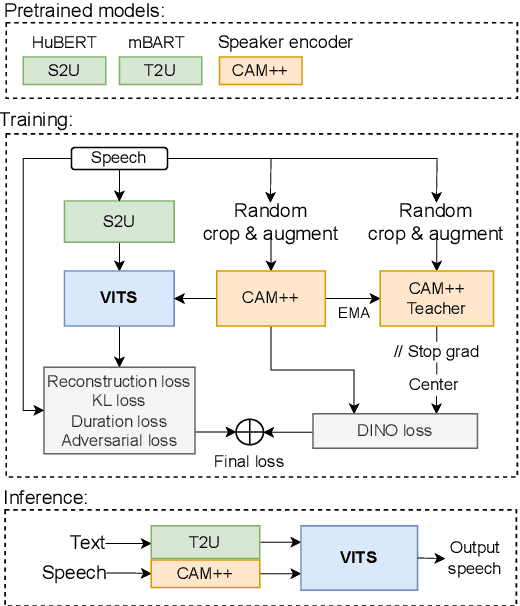Maksim Borisov
NonverbalTTS: A Public English Corpus of Text-Aligned Nonverbal Vocalizations with Emotion Annotations for Text-to-Speech
Jul 17, 2025Abstract:Current expressive speech synthesis models are constrained by the limited availability of open-source datasets containing diverse nonverbal vocalizations (NVs). In this work, we introduce NonverbalTTS (NVTTS), a 17-hour open-access dataset annotated with 10 types of NVs (e.g., laughter, coughs) and 8 emotional categories. The dataset is derived from popular sources, VoxCeleb and Expresso, using automated detection followed by human validation. We propose a comprehensive pipeline that integrates automatic speech recognition (ASR), NV tagging, emotion classification, and a fusion algorithm to merge transcriptions from multiple annotators. Fine-tuning open-source text-to-speech (TTS) models on the NVTTS dataset achieves parity with closed-source systems such as CosyVoice2, as measured by both human evaluation and automatic metrics, including speaker similarity and NV fidelity. By releasing NVTTS and its accompanying annotation guidelines, we address a key bottleneck in expressive TTS research. The dataset is available at https://huggingface.co/datasets/deepvk/NonverbalTTS.
Low-resource Machine Translation for Code-switched Kazakh-Russian Language Pair
Mar 25, 2025Abstract:Machine translation for low resource language pairs is a challenging task. This task could become extremely difficult once a speaker uses code switching. We propose a method to build a machine translation model for code-switched Kazakh-Russian language pair with no labeled data. Our method is basing on generation of synthetic data. Additionally, we present the first codeswitching Kazakh-Russian parallel corpus and the evaluation results, which include a model achieving 16.48 BLEU almost reaching an existing commercial system and beating it by human evaluation.
DINO-VITS: Data-Efficient Noise-Robust Zero-Shot Voice Cloning via Multi-Tasking with Self-Supervised Speaker Verification Loss
Nov 17, 2023



Abstract:Recent progress in self-supervised representation learning has opened up new opportunities for training from unlabeled data and has been a growing trend in voice conversion. However, unsupervised training of voice cloning seems to remain a challenging task. In this paper we propose a semi-supervised zero-shot voice cloning approach that works by adapting a HuBERT-based voice conversion system to the voice cloning task and shows the robustness of such a system to noises both in training data (we add noises resulting in up to 0db signal-to-noise-ratio to 35% of training data with no significant degradation of evaluation metrics) and in the target speaker reference audio at inference. Moreover, such a method does not require any type of denoising or noise-labeling of training data. Finally, we introduce a novel multi-tasking approach by incorporating self-supervised DINO loss into joint training of a CAM++ based speaker verification system and a unit-based VITS cloning system. We show that it significantly improves the quality of generated audio over baselines, especially for noisy target speaker references.
 Add to Chrome
Add to Chrome Add to Firefox
Add to Firefox Add to Edge
Add to Edge